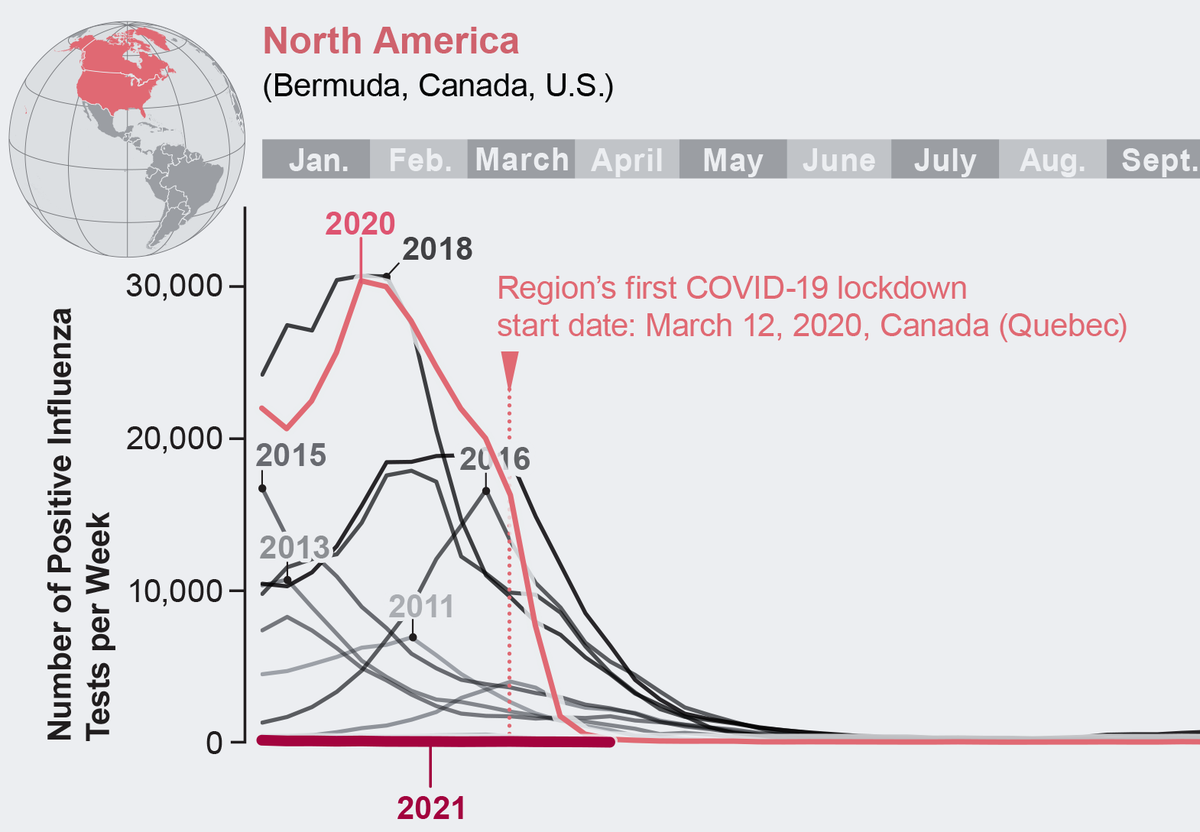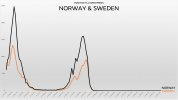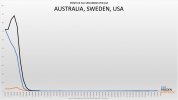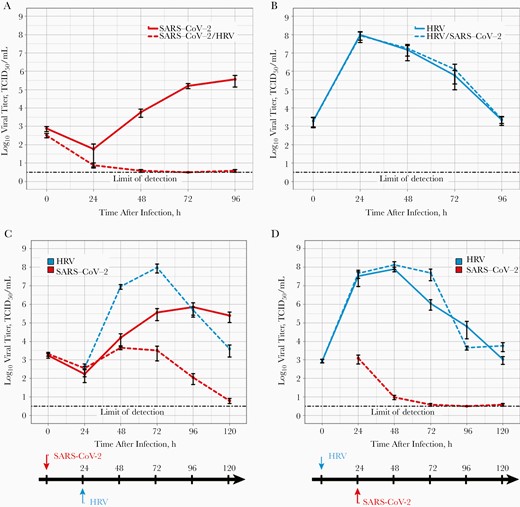I came across this poorly written article today:

 www.scientificamerican.com
www.scientificamerican.com
That's a decrease of a factor of nearly 60!
(Of course the true number would surely be far higher if deaths were measured with flu rather than due to flu but that's a whole new topic )
)
There is no doubt that Sars-CoV-2 has pushed influenza out, but the key question is why?
I do not believe that the unnamed epidemiologists who purportedly claim it was due to "public health measures"; if this is true then the countries with the least stringent measures are also being successful, and you'd also expect a correlation between stringency of measures and levels of flu. But there is no evidence of this.
I believe viral interference is much more likely, for example the 2009 H1N1 pandemic may have been disrupted by Rhinovirus strains:

I've also wondered if Rhinovirus infections among school children have kept Sars-CoV-2 cases relatively low, particularly around September/October, which is when the Rhinovirus season commences.
Also, some people claim flu has gone. It hasn't; it's just at very low levels.

 www.thetimes.co.uk
www.thetimes.co.uk
So it's great news that levels of flu are really low, but I think it's important not to draw the wrong conclusions and to keep an open mind.

Flu Has Disappeared for More Than a Year
Mask wearing, social distancing and other steps to stop COVID-19 have also curtailed influenza
The article goes on to state that the reduction in the US was from 34,000 flu deaths two years ago down to 600.Since the novel coronavirus began its global spread, influenza cases reported to the World Health Organization have dropped to minuscule levels. The reason, epidemiologists think, is that the public health measures taken to keep the coronavirus from spreading also stop the flu
That's a decrease of a factor of nearly 60!
(Of course the true number would surely be far higher if deaths were measured with flu rather than due to flu but that's a whole new topic
There is no doubt that Sars-CoV-2 has pushed influenza out, but the key question is why?
I do not believe that the unnamed epidemiologists who purportedly claim it was due to "public health measures"; if this is true then the countries with the least stringent measures are also being successful, and you'd also expect a correlation between stringency of measures and levels of flu. But there is no evidence of this.
I believe viral interference is much more likely, for example the 2009 H1N1 pandemic may have been disrupted by Rhinovirus strains:

Interference between rhinovirus and influenza A virus: a clinical data analysis and experimental infection study
These findings show that one respiratory virus can block infection with another through stimulation of antiviral defences in the airway mucosa, supporting the idea that interference from rhinovirus disrupted the 2009 IAV pandemic in Europe. These results indicate that viral interference can...
www.thelancet.com
During the 2009 pandemic of an emerging influenza A virus (IAV; H1N1pdm09), data from several European countries indicated that the spread of the virus might have been interrupted by the annual autumn rhinovirus epidemic. We aimed to investigate viral interference between rhinovirus and IAV with use of clinical data and an experimental model...
These findings show that one respiratory virus can block infection with another through stimulation of antiviral defences in the airway mucosa, supporting the idea that interference from rhinovirus disrupted the 2009 IAV pandemic in Europe. These results indicate that viral interference can potentially affect the course of an epidemic...
I've also wondered if Rhinovirus infections among school children have kept Sars-CoV-2 cases relatively low, particularly around September/October, which is when the Rhinovirus season commences.
Also, some people claim flu has gone. It hasn't; it's just at very low levels.

Pneumonia and flu now kill more people than Covid
Covid-19 death rate at lowest level in seven months as flu and pneumonia overtake
I suspect the disparity may be greater, as there is less likelihood of testing of flu.More people are dying from flu and pneumonia than from the coronavirus for the first time since the second wave. Deaths from the virus have fallen by a third in a week, according to official figures.
Covid-19 was listed as the underlying cause of death of 176 of the victims. In comparison, flu and pneumonia were the underlying cause for 278 deaths in the same seven-day period and were mentioned on 1,203 certificates.
So it's great news that levels of flu are really low, but I think it's important not to draw the wrong conclusions and to keep an open mind.






